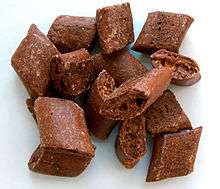Magenbrot
 | |
| Type | Pastry |
|---|---|
| Region or state | Northern Switzerland, southern Germany |
| Main ingredients | Cloves, cinnamon, star anise, nutmeg, cocoa, honey or sugar |
Magenbrot is a small, sweet glazed biscuit that shares many similarities with a gingerbread cookie.[1] The name of the dish directly translates to "stomach-bread"[2] as it is believed to help improve digestion.[3] This recipe originated in Germany and is usually sold in Christmas markets all over Europe.[4] It is known by many names including Honigkuchen, Gewürzkuchen, or Kräuterbrot.
Appearance and composition
Magenbrot is known for its diamond shape and dark brown exterior.[5] This pastry is made with flour, wheat, baking soda, star anise, cinnamon, cloves, and nutmeg and sweetened using honey and sugar. Candied orange, lemon peel, and hazelnut are also added for flavoring.[6] Some types of Magenbrot are coated with a sweet Cocoa glaze.[7]
It is usually prepared over a period of two days.[6] The dough is made beforehand and left for an entire night so it can settle properly. It is then separated into small pieces and baked in an oven.
Magenbrot was also previously called Alpenkräuter-Brot (Alpine herbs bread).[8]
See also
References
- ↑ Spiegel, Mary Jo (10 December 2003). "You Won't Need Translator to Enjoy Magenbrot". The Cincinnati Enquirer. Retrieved 3 December 2013.
- ↑ "Magenbrot", food52.com. Retrieved 3 December 2013.
- ↑ Glenn Rinsky; Laura Halpin Rinsky (2008), The Pastry Chef's Companion: A Comprehensive Resource Guide for the Baking and Pastry Professional, John Wiley and Sons, p. 170, ISBN 978-0-470-00955-0, retrieved 2011-06-04
- ↑ Kapur, Avani. The Christmas Markets in Europe." The Florence Newspaper. Retrieved 3 December 2013
- ↑ Cohen, Marlies. "Magenbrot (Stomach Bread Pasties)." Retrieved 3 December 2013
- 1 2 "Magenbrot (Sweet Pieces of Bread)." About.ch. Retrieved 3 December 2013
- ↑ Rieder, Christian. "Vom Magenbrot und den Magenmorsellen." Basel Insider Website. Retrieved 3 December 2013
- ↑ Schweizer Familie 41/2009, p. 37